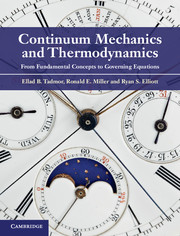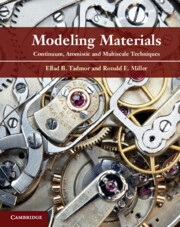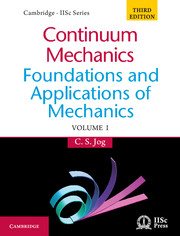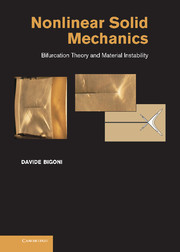Continuum Mechanics and Thermodynamics
Continuum mechanics and thermodynamics are foundational theories of many fields of science and engineering. This book presents a fresh perspective on these fundamental topics, connecting micro- and nanoscopic theories and emphasizing topics relevant to understanding solid-state thermo-mechanical behavior. Providing clear, in-depth coverage, the book gives a self-contained treatment of topics directly related to nonlinear materials modeling. It starts with vectors and tensors, finite deformation kinematics, the fundamental balance and conservation laws, and classical thermodynamics. It then discusses the principles of constitutive theory and examples of constitutive models, presents a foundational treatment of energy principles and stability theory, and concludes with example closed-form solutions and the essentials of finite elements. Together with its companion book, Modeling Materials, (Cambridge University Press, 2011), this work presents the fundamentals of multiscale materials modeling for graduate students and researchers in physics, materials science, chemistry and engineering.
- Develops topics step-by-step, building up from fundamental ideas and concepts to more complex principles, to help students understand the underlying principles
- Discusses foundational topics often glossed over in other texts
- Gives an integrated discussion of continuum mechanics and thermodynamics for a complete understanding of thermo-mechanical processes in materials
Reviews & endorsements
"I find it quite impressive that despite writing about such an old subject, these authors were able to present it with a very distinct personal style and perspective. The book is written in a very contemporary style and is full of well-thought out (solved) examples. I found it very enjoyable to read. Nearly every other page has footnotes which are in turns quirky, humorous or just plain factual but always informative and add an exceptional value to the text."
Pradeep Sharma, iMechanica
"The authors present the material clearly, with care taken to provide detailed derivations when needed and heuristic arguments, when those suffice. The end-of-chapter exercises are well-designed, and this text could very profitably be used as the basis for an undergraduate/graduate course in continuum mechanics, suitable for both science and engineering students. The author should be congratulated on producing a fine textbook, one that meets the needs of a variety of disciplines."
Andrew Resnick, Cleveland State University for Contemporary Physics
Product details
February 2012Hardback
9781107008267
372 pages
253 × 195 × 22 mm
0.97kg
43 b/w illus. 95 exercises
Available
Table of Contents
- 1. Introduction
- 2. Scalars, vectors and tensors
- 3. Kinematics of deformation
- 4. Mechanical conservation and balance laws
- 5. Thermodynamics
- 6. Constitutive relations
- 7. Boundary-value problems, energy principles and stability
- 8. Universal equilibrium solutions
- 9. Numerical solutions: the finite element method
- 10. Approximate solutions: reduction to the engineering theories
- 11. Further reading
- Appendices
- Index.





